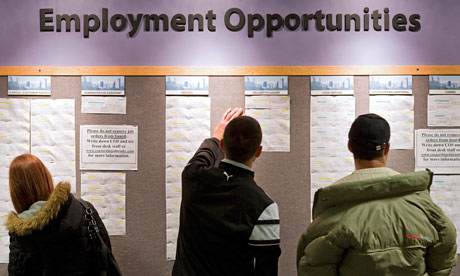
Missing from all the chatter about jobs, jobs, jobs is this: we're becoming a nation of freelancers. The US is no longer an industrial-based society where you can count on having a job for life and a sparkly new watch at your retirement party. (And forget about that pension.) According to the Freelancers Union, one in three workers are now toiling as freelancers, temps, "permalancers", perma-temps, contractors, contingent workers, etc. That amounts to some 42 million freelancers in the US – people who are working without the benefit of employer-sponsored health insurance, 401k plans and flexible spending accounts.
Sure, there are upsides to going the indie route – like, say, working in your pajamas and taking yoga whenever you damn well please. But for many contingent workers, self-employed living is far from idyllic.
No one mentioned this last Friday, when in the midst of apocalyptic handwringing over the global economy, there was a ray of light: the latest jobs figures released by the Bureau of Labor Statistics. Unemployment is down; jobs are up, even in the black community, where unemployment has been, stubbornly and dishearteningly unyielding. Unemployment numbers haven't been this rosy (well, relatively rosy) since 2009. Wall Street rallied; the president did a victory lap, urging Congress to keep the economy moving and the payroll tax cut with an exuberant: "Don't muck it up!"
None of this is likely to change the everyday lives of contingent workers.
It's hard to get a real count of how many freelancers are out there; not least because the federal government hasn't tracked contingent workers since 2005. That, of course, was before the economy tanked and the Great Recession held all our lives hostage. I'd wager that many more workers are flying solo without the safety net of employer benefits. Today's contract workers are lawyers, journalists, daycare workers, graphic artists, accountants, videographers … whatever the job description, independent living frequently means floating from project to project, cobbling together a living from many different sources. If you're lucky.
Some do this by choice; others because there is no choice. As I've mentioned before, companies long since discovered that it's a hell of a lot cheaper to hire someone on a contingency basis than it is to put someone on the payroll. "There has been a growing number of contingent workers," says William Rogers, a Rutgers University economist. "A good chunk of it is thanks to downsizing and how technology has restructured work." Today, Rogers says, the fastest growing labor union is the Freelancers Union. (Full disclosure: I am a contractor for The Root; and recently joined the Freelancers Union.)
But contingency workers are a vulnerable lot. Often, they're working full-time alongside salaried employees in the office, but as freelancers, they're not eligible for unemployment insurance should they lose their jobs. Nor is there much recourse for them should they face any kind of discrimination, or even if their client/boss decides not to pay them. Then, there's the nightmare of trying to find affordable individual health insurance. Many independent workers just go without it all together. One uninsured friend, who runs a small publishing house, jokes that she's taken up healthy eating and a holistic lifestyle because she can't afford to get sick.
According to the Labor Department, employers often misclassify independent contractors as employees, locking misclassified freelancers out of benefits like tax write-offs for health insurance that they're already paying for, all by themselves. For freelancers, it's much, much harder to qualify for a loan, refinance their mortgage or, if they're underwater on their homes, to find relief from loan modification programs.
I know a woman who was told, off the record, that the company that was considering hiring her would only do so on a contract basis – they didn't want to take on the expense of hiring her because of her considerable medical bills. (She didn't get the job.) Another associate thought he'd hit pay dirt with a high-paying, full-time salaried position at a big-name software company. But then, suddenly – right as he was ready to sign the paperwork – they rescinded their offer. Instead, they told him that they could only offer him a contract position on a project-by-project basis.
If this is how our economy is now organized, then we need safety nets for independent workers. And we need to start by acknowledging, as a nation, that while it's all very good to talk about job creation, for many of us, a regular 9-to-5 gig is no longer a reality. Work has changed; the American worker is changing. Old-school labor paradigms no longer fit.
• This article was suggested in a user comment by RipThisJoint

